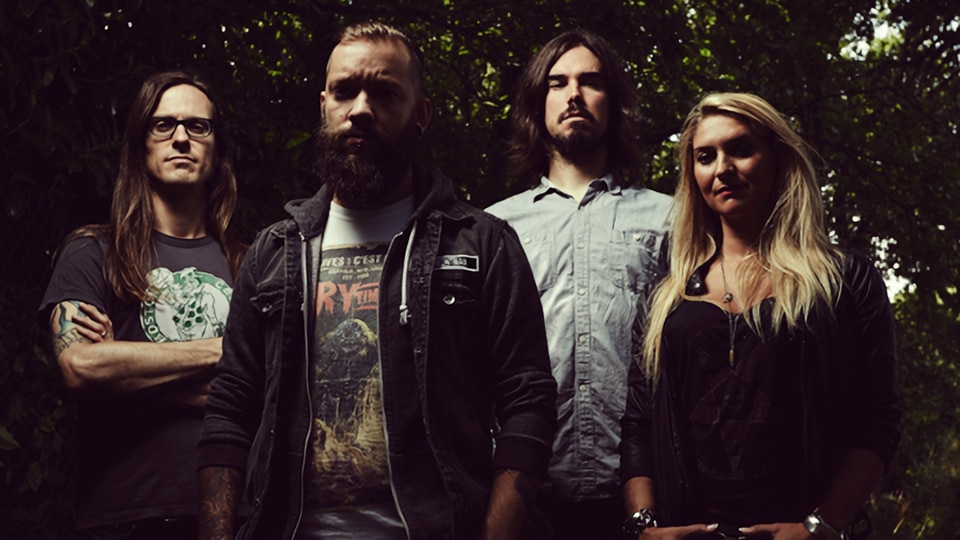Despite its extreme and seemingly uniform nature, metal as a genre actually encompasses a wide variety of sounds. Beyond its endless list of subgenres, metal works really well in hybrid form with other vastly different genres – folk, jazz, classical and alternative rock, to name a few. Metal hybrid bands will often take on some definitive aspects of metal while omitting others – for example, you might hear the heavily distorted, down-tuned guitars, and screaming vocals but no guitar solos or fast drumming. One such band is French alternative metal band AqME, who released their debut album Sombres Effort in 2002. The way they fuse alternative rock with nu-metal puts them sonically closer to bands like Nirvana and Soundgarden – two bands the Parisian quartet considered to be main influences – than metallic stalwarts Iron Maiden and Metallica.
AqME bassist Charlotte Poiget rocked a characteristically nu-metal five-string Gibson Thunderbird, while original guitarist Benjamin Rubin sported a six-string Gibson Flying V or Les Paul, among others. The lowest string on a standard-tuned five-string bass is a low B, with the rest of the strings tuned similarly to a four-string bass (E A D G). Five-string basses are ideal for bands with either seven-string or down-tuned guitars; seven-string guitars also have a low B for their bottom string, with the rest of the strings tuned like a standard six-string guitar (E A D G B E). In AqME's case, Benjamin would down-tune his six strings to B standard (B E A D F# B), blending well with Charlotte's standard-tuned five-string Thunderbird. Earlier on in the band's career, Charlotte mostly played finger-style, even when stomping on a distortion pedal during a song's loud parts, but then eventually switched to playing with a pick, for added aggression and a more percussive bass tone. Many AqME songs, like "'Si' N'existe Pas" from their debut, follow a quiet-loud-quiet-loud dynamic pattern, with Benjamin's glassy chorus-effected clean tones abruptly morphing into fuzzed-out low B power chords.
Eschewing guitar solos entirely, AqME's hooks lie in Benjamin's catchy guitar riffing, supported by Charlotte's bass embellishments and the vocal melodies of lead singer Thomas "Koma" Thirrion (later replaced by Vincent "Vinc" Peignart-Mancini in 2012). The down-tempo "Tout à un Detail Près" features the band's softer side, reminiscent of Nirvana's "Heart Shaped Box". Koma's melancholic breathy singing carries the emotional weight of the song, with brief backing vocals courtesy of Charlotte in the second half of the chorus. Sole original member Etienne Sarthou's drumming style is minimal until the 2:15 mark, when he ramps up the energy with a heavier tribal beat blasted over with Charlotte's bass fuzz.
True to their name – inspired by the ancient Greek "akmê" meaning climax, or turning point – AqME brought an impressive level of intensity and dynamics with their simple, no-frills approach. Sometimes you only need a satisfying head-banging riff or two to make an impact, and AqME knew how to deliver just that.
Leila Abdul-Rauf is a multi-instrumentalist and composer based in Oakland, CA. Leila is guitarist and vocalist for metal bands Vastum, Hammers of Misfortune, and ethereal post-punk band Terebellum. She also composes and produces ambient music under her own name, with electronic trio Ionophore, and with synth-folk duo Fyrhtu. She has toured internationally and is a private guitar and voice teacher in her spare time.
AqME 2014 by M.Ezan - www.aqme.com is licensed under CC BY-SA 4.0.
Learn to play these songs and many more. Try Rocksmith+ yourself and take the next step on your musical journey.



